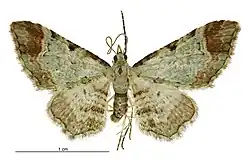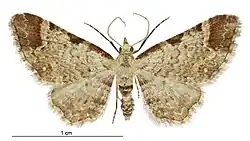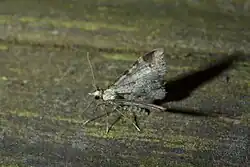Pasiphila magnimaculata
| Pasiphila magnimaculata | |
|---|---|

| |
| Female | |

| |
| Male | |
| Scientific classification | |
| Kingdom: | Animalia |
| Phylum: | Arthropoda |
| Class: | Insecta |
| Order: | Lepidoptera |
| Family: | Geometridae |
| Genus: | Pasiphila |
| Species: | P. magnimaculata
|
| Binomial name | |
| Pasiphila magnimaculata | |
| Synonyms | |
| |
Pasiphila magnimaculata is a moth of the family Geometridae.[1] This species was first described by Alfred Philpott in 1915. It is endemic to New Zealand and has been observed in both the North and South Islands.
Taxonomy
This species was first described by Alfred Philpott in 1915 using specimens collected in Queenstown by Merlin Owen Pasco and originally named Chloroclystis magnimaculata.[2] In 1928 George Hudson illustrated and discussed this species under that name in his book The butterflies and moths of New Zealand.[3] In 1971 John S. Dugdale placed this species in the genus Pasiphila.[4] The male holotype specimen is held at the New Zealand Arthropod Collection.[5]
Description
.jpg)
Philpott originally described the adults of this species as follows:
♂♀. 19-21 mm. Head, palpi, and thorax greyish-green, in ♀ ochreous. Palpi 2. Antennae in ♂ ciliate-fasciculate, ciliations 4. Abdomen greenish-grey, in ♀ ochreous, with a reddish-fuscous antemedian band. Forewings triangular, costa gently arched, termen subsinuate, moderately oblique ; greyish-green ; costa narrowly reddish to 1⁄4 ; numerous reddish-fuscous waved lines from base to 3⁄4 , forming curved fascia at 1⁄3 ; outer edge of median band broadly and obtusely projecting at middle ; a large apical blotch of bright reddish-fuscous ; a smaller and paler tornal blotch with a minute white dot near centre ; subterminal line serrate, grey-green ; a reddish-fuscous line round termen : cilia greyish-green, suffused with reddish-fuscous except at middle of termen. Hindwings unevenly rounded ; pale greenish-grey ; a reddish-fuscous discal dot and numerous obscure waved reddish-fuscous striae, more prominent on dorsum : cilia greenish-grey with faint reddish-fuscous bars.[2]
This species is very variable in appearance especially with regard to the intensity of colour pattern of specimens.[5]
Distribution

P. magnimaculata is endemic to New Zealand and has been observed in both the North and South Islands including in the Otago region and on Quail Island.[1][6][7]
Habitat and hosts
This species usually inhabits montane areas.[6] The larvae feed on the flowers of Gaultheria crassa.[7]
Behaviour
Adults have been observed on the wing from October to February.[8]
References
- ^ a b c "Pasiphila magnimaculata (Philpott, 1915)". www.nzor.org.nz. Landcare Research New Zealand Ltd. Retrieved 26 January 2017.
- ^ a b Alfred Philpott (12 July 1915). "Descriptions of new species of Lepidoptera". Transactions and Proceedings of the New Zealand Institute. 47: 193. ISSN 1176-6158. Wikidata Q66084596.BHL page 3343645
 This article incorporates text from this source, which is in the public domain.
This article incorporates text from this source, which is in the public domain.
- ^ Hudson, G. V. (1928), The butterflies and moths of New Zealand, Illustrator: George Hudson, Wellington: Ferguson and Osborn Limited, p. 94, LCCN 88133764, OCLC 25449322, Wikidata Q58593286BHL page 61899705
 This article incorporates text from this source, which is in the public domain.
This article incorporates text from this source, which is in the public domain.
- ^ Dugdale, J. S. (10 November 1971). "Entomology of the Aucklands and other islands south of New Zealand: Lepidoptera, excluding non-crambine Pyralidae". Pacific Insects Monographs. 27: 106. ISSN 0078-7515. Wikidata Q64006453.
- ^ a b Dugdale , J. S. (23 September 1988). "Lepidoptera - annotated catalogue, and keys to family-group taxa". Fauna of New Zealand. 14. Department of Scientific and Industrial Research: 188. doi:10.7931/J2/FNZ.14. ISSN 0111-5383. Wikidata Q45083134.
- ^ a b Patrick, H.J.H.; Bowie, M.H.; Fox, B.W.; Patrick, B.H. (2011). "The moths of Quail Island (Otamahua): a faunal comparison of an island under restoration with other sites on Banks Peninsula" (PDF). New Zealand Natural Sciences Journal. 36: 57–72. Archived from the original (PDF) on 2016-03-03. Retrieved 2017-01-26.
- ^ a b Brian H. Patrick; Brian M. Lyford; John B. Ward; Barbara I.P. Barratt (December 1992). "Lepidoptera and other insects of the Rastus Burn Basin, The Remarkables, Otago". Journal of the Royal Society of New Zealand. 22 (4): 276. doi:10.1080/03036758.1992.10420820. ISSN 0303-6758. Wikidata Q60326057.
- ^ "Pasiphila magnimaculata (Philpott, 1915)". www.gbif.org. Retrieved 2025-08-07.